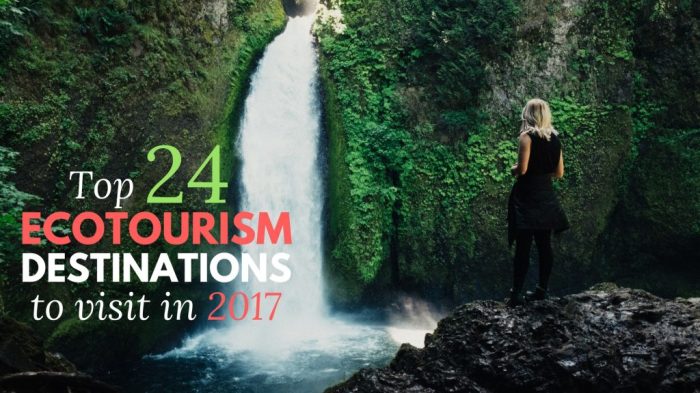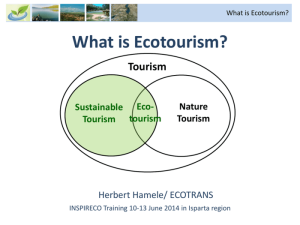
Embark on a journey through the world of ecotourism with our guide to the top activities that not only enrich your travel experience but also contribute to conservation efforts. Discover how responsible tourism can make a positive impact on the environment and local communities.
ECOTOURISM

Ecotourism is a form of travel that focuses on responsible and sustainable exploration of natural environments while contributing to the conservation of biodiversity and the well-being of local communities.
Unlike traditional tourism, which often prioritizes mass tourism and luxury accommodations, ecotourism places a strong emphasis on minimizing the negative impact on the environment and supporting local conservation efforts and community development.
Popular Ecotourism Destinations
- Costa Rica: Known for its rich biodiversity, Costa Rica offers eco-friendly accommodations and a wide range of outdoor activities such as hiking, bird watching, and sustainable wildlife tours.
- Galapagos Islands: These iconic islands off the coast of Ecuador are a UNESCO World Heritage Site and offer opportunities to see unique wildlife species up close in their natural habitats.
- Kenya: With its diverse landscapes and wildlife, Kenya offers ecotourism experiences such as safari tours, community-based conservation projects, and visits to local indigenous communities.
Benefits of Ecotourism
- Environmental Conservation: By promoting sustainable practices and raising awareness about the importance of protecting natural habitats, ecotourism contributes to the preservation of biodiversity and ecosystems.
- Community Empowerment: Ecotourism provides local communities with economic opportunities, helps preserve traditional cultures, and fosters social development through community-based projects and initiatives.
- Educational Opportunities: Ecotourism offers travelers the chance to learn about environmental conservation, wildlife protection, and sustainable living practices, fostering a deeper appreciation for nature and the importance of preserving it for future generations.
Top Ecotourism Activities
Ecotourism activities offer travelers a unique opportunity to experience nature while contributing to conservation efforts. Engaging in these activities helps promote sustainability and protect the environment for future generations.
Hiking and Nature Walks
One of the most popular ecotourism activities is hiking or taking nature walks through forests, mountains, or national parks. This allows travelers to immerse themselves in natural habitats and observe wildlife in their natural environment.
Snorkeling and Diving
Exploring marine ecosystems through snorkeling and diving is another top ecotourism activity. By experiencing the underwater world, travelers gain a greater appreciation for marine life and the importance of preserving fragile coral reefs.
Wildlife Safaris
Going on a wildlife safari in a protected area gives travelers the chance to see animals like lions, elephants, and rhinos up close. These experiences help raise awareness about conservation efforts and the need to protect endangered species.
Volunteering in Conservation Projects
Participating in volunteer programs focused on conservation allows travelers to make a direct impact on preserving natural habitats and wildlife. These experiences provide valuable assistance to organizations working towards environmental sustainability.
Tree Planting and Reforestation
Engaging in tree planting and reforestation activities is a hands-on way for travelers to contribute to combating deforestation and climate change. By planting trees, individuals help restore ecosystems and promote biodiversity.
Responsible Wildlife Watching
Practicing responsible wildlife watching by following ethical guidelines and respecting animals’ natural behavior is essential in ecotourism. This ensures that travelers do not disrupt ecosystems or harm wildlife while enjoying nature.
Choosing Eco-Friendly Accommodations
Opting for eco-friendly accommodations that prioritize sustainability and minimize environmental impact is crucial for responsible ecotourism. Staying in lodges or hotels that support local communities and conservation efforts helps promote sustainable travel practices.
Wildlife Watching
When it comes to ecotourism, wildlife watching is a popular activity that allows travelers to connect with nature and observe animals in their natural habitats. However, it is essential to consider the ethical implications of wildlife watching to ensure the well-being of the animals and the preservation of their habitats.
Exploring Ethical Considerations
Wildlife watching in ecotourism raises questions about the impact of human presence on animals and their environments. It is crucial to prioritize the welfare of the wildlife and minimize any disturbances caused by tourists.
Impact on Animal Behavior and Habitats
- Increased human activity can disrupt natural behaviors and feeding patterns of animals.
- Overcrowding in popular wildlife watching areas can lead to stress and habitat degradation.
- Noise pollution from tourists can affect communication and breeding habits of wildlife.
Guidelines for Responsible Wildlife Watching
- Avoid getting too close to animals to prevent stress and potential aggression.
- Respect wildlife habitats by staying on designated trails and not disturbing vegetation.
- Do not feed wild animals, as it can alter their natural diet and behavior.
Destinations for Sustainable Wildlife Watching
- The Galapagos Islands: Known for its strict conservation measures and unique wildlife species.
- Costa Rica: Offers a variety of eco-friendly tours focused on wildlife conservation.
- Maasai Mara National Reserve, Kenya: Provides opportunities to witness the annual wildebeest migration.
Nature Walks and Hiking

Nature walks and hiking are popular ecotourism activities that offer numerous benefits to both visitors and the environment. These activities provide an opportunity to connect with nature, promote physical well-being, and foster a sense of environmental stewardship.
Benefits of Nature Walks and Hiking
- Immerse in nature: Walking or hiking through natural landscapes allows visitors to immerse themselves in the beauty of the environment, promoting relaxation and stress relief.
- Physical exercise: These activities provide a great way to stay active and improve physical fitness while enjoying the outdoors.
- Environmental awareness: By exploring natural habitats on foot, visitors can gain a deeper understanding of local ecosystems and wildlife, fostering environmental awareness and appreciation.
Safety Tips for Nature Walks and Hiking
- Stay on designated trails to avoid disturbing wildlife and damaging vegetation.
- Be prepared with proper gear, including sturdy footwear, water, snacks, a map, and a first aid kit.
- Respect wildlife from a distance and avoid feeding them to maintain their natural behaviors.
Recommendations for Eco-Friendly Gear
- Opt for reusable water bottles and food containers to minimize waste during your outdoor adventures.
- Choose eco-friendly sunscreen and insect repellent to reduce the impact on the environment.
- Consider using solar-powered or rechargeable outdoor gadgets to limit the use of disposable batteries.
As you wrap up your ecotourism adventure, remember that every choice you make as a traveler can make a difference. By engaging in sustainable activities and embracing responsible practices, you play a vital role in preserving our planet’s natural wonders for future generations to enjoy.
FAQ Corner
What are some popular ecotourism destinations?
Popular ecotourism destinations include Costa Rica, Galapagos Islands, and Borneo.
How do ecotourism activities contribute to conservation efforts?
Ecotourism activities help raise awareness about environmental issues and provide financial support for conservation projects.
What gear is recommended for nature walks and hikes?
It’s recommended to use eco-friendly gear such as reusable water bottles, biodegradable sunscreen, and sturdy hiking boots.





